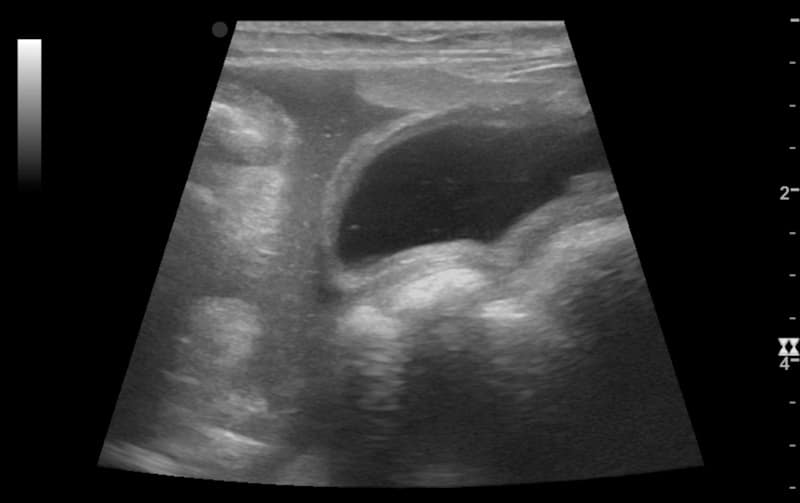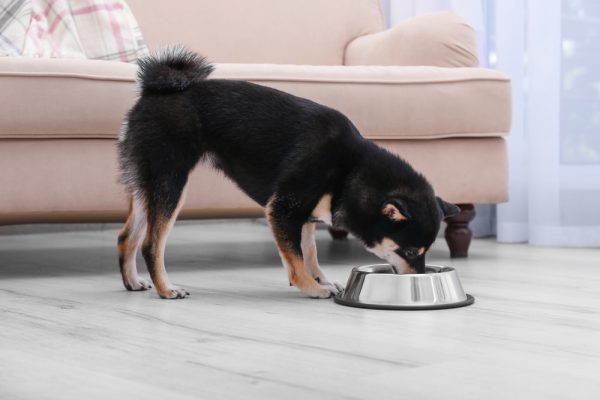The medical name for fluid in the abdomen is “abdominal effusion” or “ascites.” Not every dog with a bloated abdomen has ascites, though; pregnancy, obesity, and Cushing’s disease can all cause it. If there is fluid in the abdomen, a vet can sometimes feel it if it’s severe or diagnose it through an ultrasound examination if it is mild.
Unfortunately, there is no single cause of fluid in dogs’ abdomens. Sometimes, the fluid is blood, and other times, it is urine. It could be what is known as an “exudate” or “transudate.” Medical jargon aside, if your dog is suspected or known to have ascites, you will want to know more about the condition.

What Is Ascites?
Ascites is fluid within your dog’s abdomen that floats around freely outside their organs. Normal dogs only have a minuscule amount of free abdominal fluid, known as peritoneal fluid. This fluid provides lubrication for the organs, and young puppies have more of it than dogs.
Fluid can be leaked or accumulated outside of organs for various reasons. Large amounts of fluid can be uncomfortable and put pressure on the chest cavity, restricting a dog’s breathing. The fluid is characterized by its characteristics. The types of free abdominal fluid involved in ascites include:
- Hemorrhage: Contains red blood cells and indicates internal bleeding
- Transudate: Clear and colorless fluid, not much protein or cells
- Exudate: Fluid that is cloudy and contains inflammatory cells
- Bile: Yellow, green, or brown fluid that leaks from the gall bladder or bile duct
- Urine: Urine leaking into the abdomen from the urinary system
- Chyle: White, fatty fluid that indicates a problem with the lymphatic system
- Malignant: Any effusion that contains cancer cells
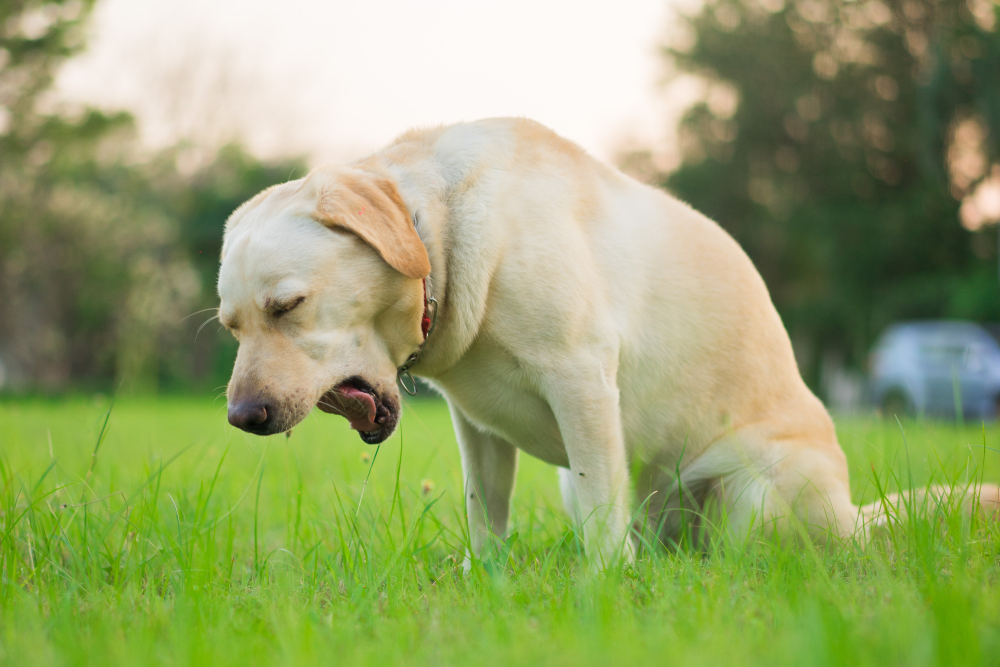
What Are the Signs of Ascites?
Dogs with ascites will show different signs depending on the cause of ascites. Dogs with mild disease and little abdominal fluid might not show any signs. As the fluid in the abdomen increases, you’ll notice their belly start to grow, and it may even feel like a water balloon. As your dog becomes more unwell, other signs can become apparent. Signs you might see are:
- Bloated abdomen
- Feeling fluid in the abdomen
- Lethargy
- Gastrointestinal signs- nausea, diarrhea, inappetence
- Increased thirst
- Discomfort
- Agitation
- Pale, purple, or blue gums
- Jaundice or yellow gums
- Not urinating
- Urinating more than usual
- Panting
- Difficulty breathing
- Collapse
If your dog is showing any of these signs, we recommend speaking with a vet.
If you need to speak with a vet but can't get to one, head over to PangoVet. It's our online service where you can talk to a vet online and get the advice you need for your dog — all at an affordable price!
The 7 Possible Causes of Ascites
Knowing the type of fluid in your dog’s abdomen can help narrow down the causes. One study in 70 dogs showed that hemorrhaging was the most common cause of ascites, followed by transudates and then exudates.1
1. Hemorrhage
Bleeding in the abdomen is a common cause of fluid in the abdomen. In this case, the fluid is blood. This internal bleeding can be caused by trauma, clotting disorders, cancer, and even an anaphylactic reaction.
Rat bait toxicity can lead to dogs being unable to form blood clots and spontaneous bleeding, including into the abdomen. Destruction of platelets is a common disorder known as immune-mediated thrombocytopenia (IMTP), which can also cause abnormal bleeding.
Cancers of the spleen, such as hemangiosarcoma, are very vascular and prone to rupture, which can lead to bleeding in the abdomen. Spleens can also have a non-cancerous bleed from a hematoma. One study showed that in dogs with blood in the abdomen, without trauma, 70% had hemangiosarcoma.2
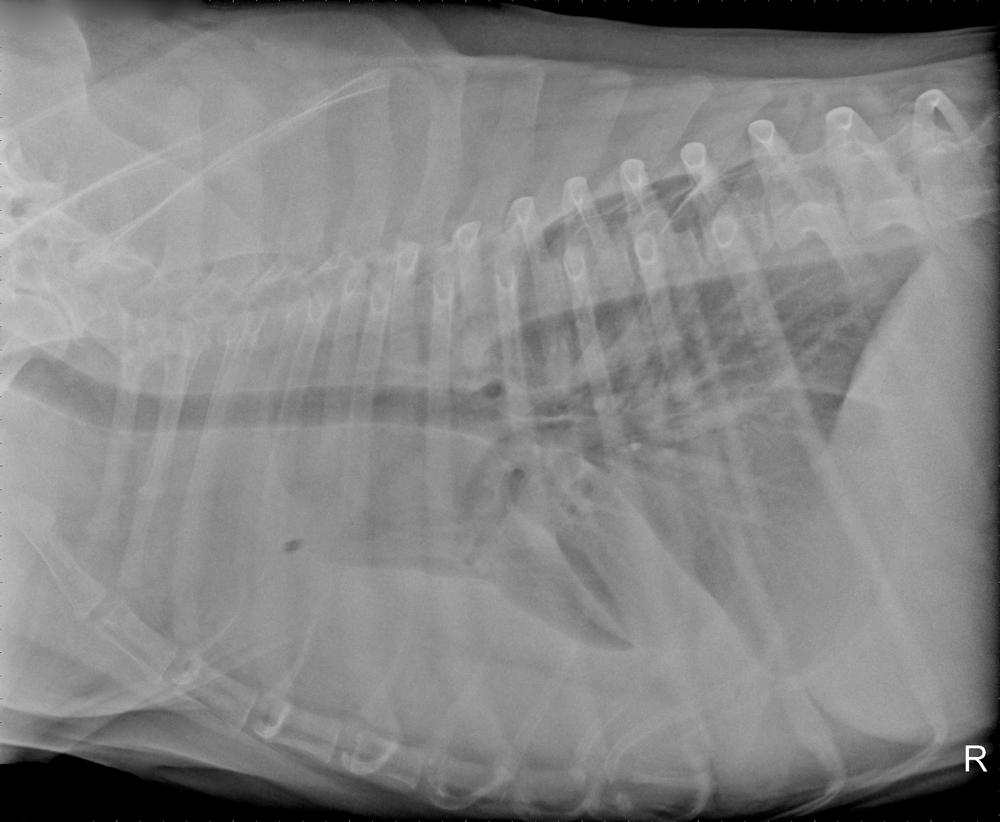
2. Transudate
A transudate in the abdomen can be caused by low blood protein. Protein, specifically albumin, acts as a force to keep fluid within vessels; when protein is low, the fluid can lead out. Chronic gastrointestinal and kidney problems can cause these protein losses.
Another cause of transudates is high venous pressure, which causes fluid to leak from vessels. High pressure in the veins can result from vessel obstructions, most likely from cancer or thromboembolism or diseases like liver cirrhosis and heart failure.
3. Exudate
An exudate indicates inflammation within the abdomen. Septic peritonitis is inflammation of the abdominal cavity caused by bacteria in the abdomen. This leads to an exudate and is usually the result of a perforation in the gastrointestinal tract, for example, by a foreign body.
Cancer, bile, and urine in the abdomen can also lead to an inflammatory response. Severe pancreatitis can also result in peritonitis, but it is sterile and does not involve bacteria.
4. Bile
Bile can leak into the abdomen when the gallbladder or bile ducts are ruptured. This can occur due to trauma or a problem within the gallbladder. A mucocele is a common structural problem in the gall bladder that can lead to rupture.
Gallstones can lead to blockage of the bile ducts and eventually rupture. Since the bile ducts travel through the liver, liver problems can also lead to this effusion.
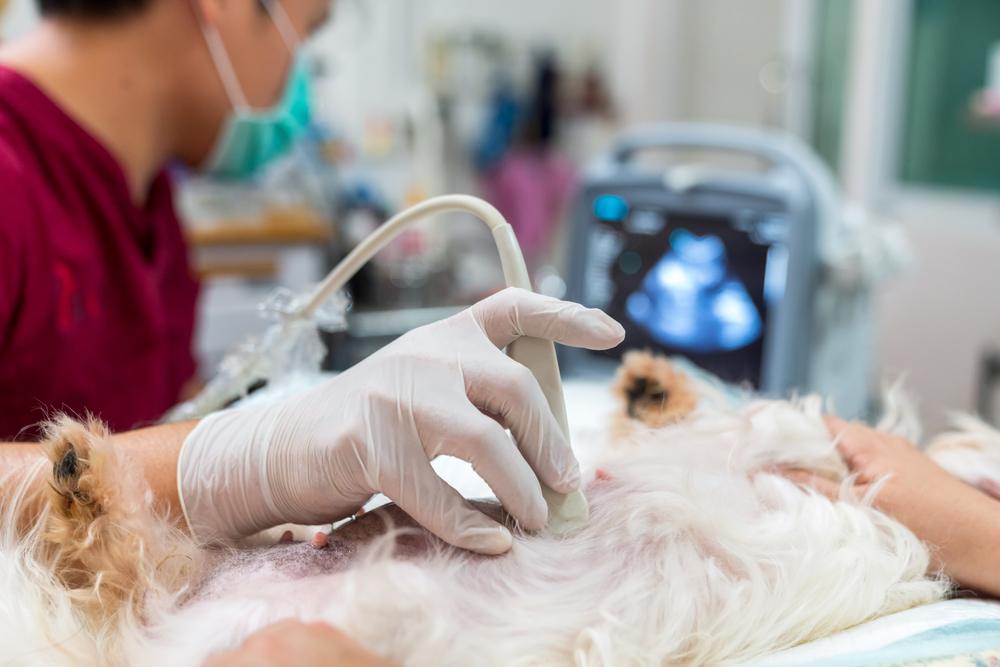
5. Urine
Urine leaks into the abdomen if the bladder or tubes from the kidneys to the bladder (ureters) rupture. Severe urinary obstructions, inflammation, and cancer can cause these organs to rupture. Trauma is also a common cause of urine in the abdomen.
6. Chyle
Effusions involving chyle leaking into the abdomen are uncommon but indicate leakage from the lymphatic system. This fluid may leak as a result of an obstruction, like a tumor.
7. Malignant
Cancers can cause inflammation, obstructions, and ruptures, resulting in many types of effusions. However, if cancer cells are noted in the abdominal fluid, we call the effusion malignant.
Unfortunately, the absence of cancer cells doesn’t mean there is no cancer; sometimes, the cancer doesn’t shed cells or is covered by other cells in the fluid. A specialist is generally needed to confirm cancer cells in a sample of abdominal fluid.

How Do I Care for a Dog With Ascites?
If you are wondering how to drain fluid from a dog’s abdomen at home, the answer is this cannot and should not be done. The act of draining fluid can sometimes be diagnostic or therapeutic but this is performed by vets using sterile techniques. Removing the fluid does not address the underlying cause or help your dog.
If your dog has ascites, this is an indicator of serious disease. Some causes are curable, whereas others, unfortunately, have a poor prognosis. If you notice signs of ascites, you should seek veterinary treatment urgently. Depending on the cause, your vet will recommend treatment options to help your dog.
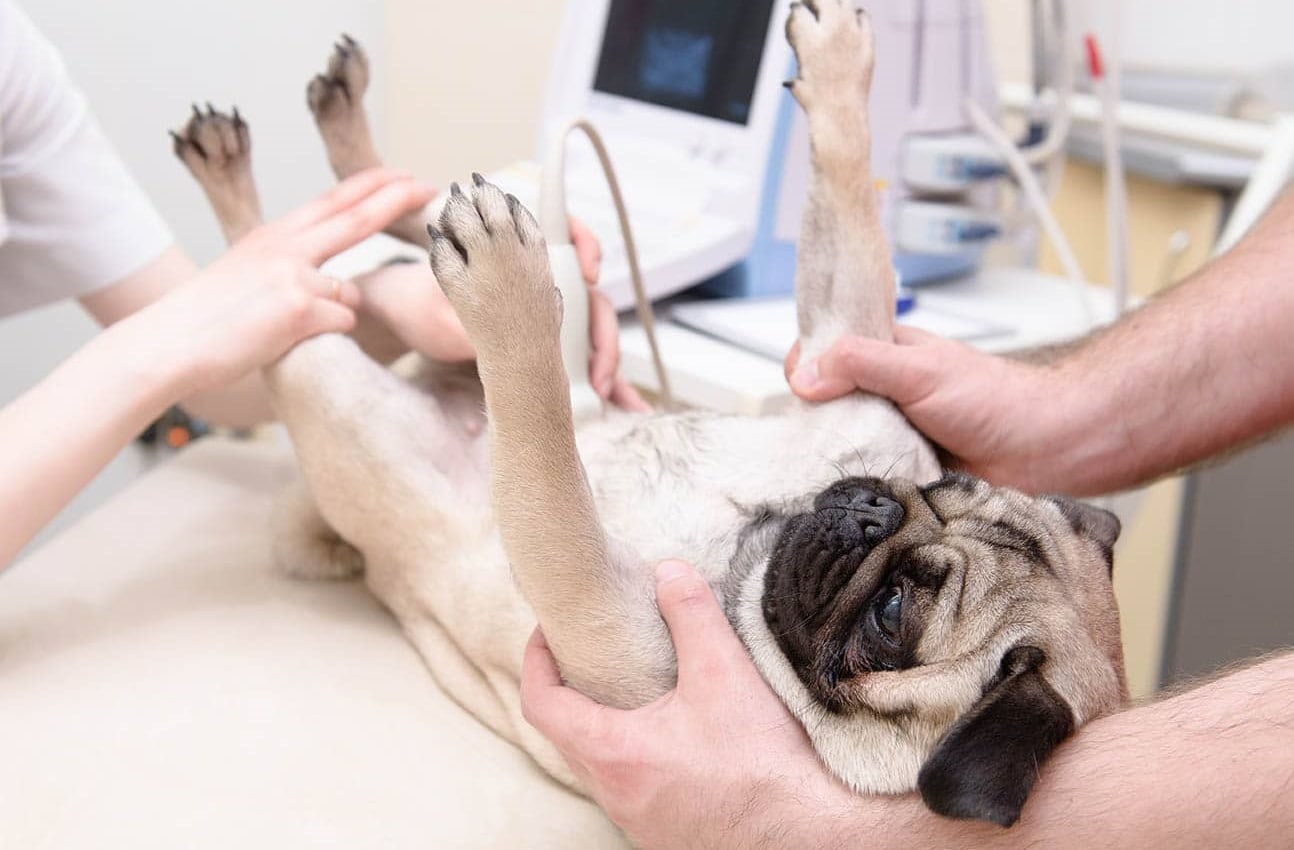
What to Expect at the Vet
Your vet will take a history, so be prepared to answer any questions about your dog’s history and illness. Answering thoroughly and honestly can help your vet diagnose your dog. If you know your dog has prior health problems, you should notify the vet. The vet will examine your dog and then discuss a diagnostic plan with you. Further tests will be needed to determine what ails your dog, and these tests could include the following:
- Blood tests
- Imaging like ultrasounds, x-rays, and CT scans
- Urine tests
- Abdominocentesis (sampling fluid from the abdomen) and lab tests on the fluid
Treatment will then be targeted at keeping your dog alive and comfortable; for example, if they have lost a lot of blood, they may need a blood transfusion. They may need pain relief or anti-nausea medication. Dehydrated animals will need a fluid drip. Dogs with heart failure are generally treated with specific medications to support the heart and promote fluid loss.
In some cases, surgery will be needed, for example, to remove a tumor or repair a ruptured bladder. Your vet should discuss the prognosis and options for your dog. Unfortunately, in cases of liver failure, metastatic cancer, and other severe diseases, the prognosis can be grave.
If your dog is severely unwell, one option would be to euthanize them to end their suffering. While we know this is a hard choice, we also know you love your dog and don’t want to see them suffer. This choice is also valid for those who are cost-constrained and can’t afford the cost of diagnostics and treatment for their sick pet.

Frequently Asked Questions (FAQ)
How Serious is Fluid in the Abdomen?
Fluid in the abdomen is a very concerning sign as it usually indicates a severe underlying disease. That being said, with correct treatment, many dogs can survive and go on to live full lives, depending on the underlying cause. So, while it’s not always fatal, it does always require vet intervention, and the chances of success are higher if treated sooner rather than later.
How Long Can Dogs Live With Ascites?
The prognosis for your dog depends on the underlying cause. For example, if your dog has a ruptured bladder or intestine and survives the first few days after surgery, the prognosis is good, and they will likely make a full recovery. One study showed a 72% survival rate for dogs with septic peritonitis. Dogs with cirrhosis of the liver, on the other hand, are not likely to improve, and the prognosis is very poor. Similarly, a dog with cancer spread throughout the body may not live much longer.
Are Dogs With Ascites in Pain?
Again, this depends on the underlying cause and the extent of the fluid. Dogs with severely bloated abdomens, ruptured organs, cancer, or trauma can be in severe pain. Dogs with ascites can also feel extremely nauseous. If your dog is vocalizing, lethargic, struggling to breathe, uninterested in their normal activities, or not themselves, they are probably in pain.
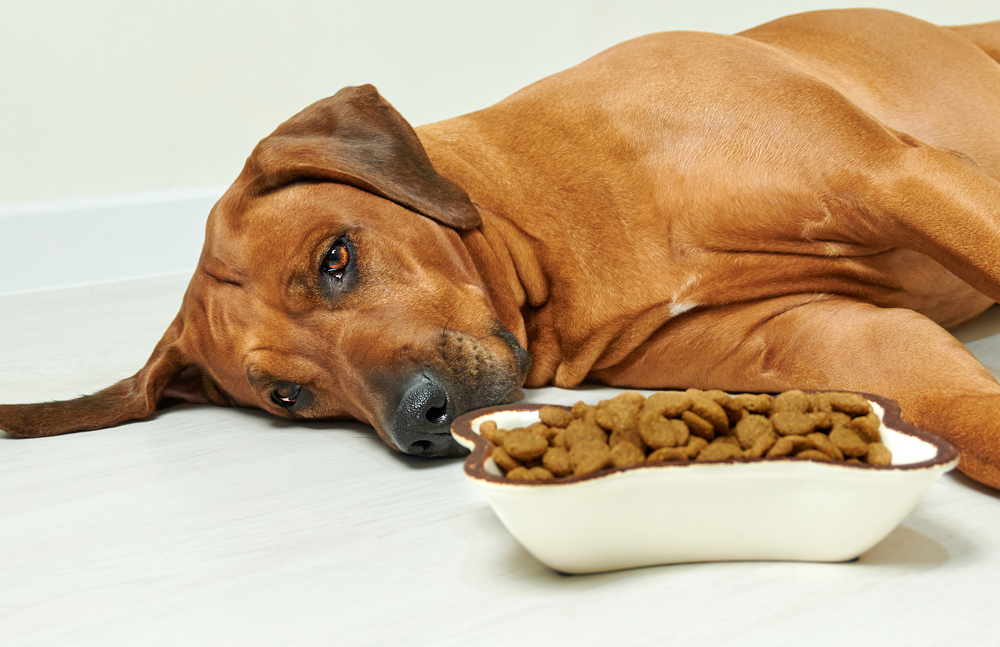

Conclusion
If your dog has free abdominal fluid, also known as ascites, you need to get them help right away. This is a very serious sign that can mean severe underlying disease. Depending on what is going on with your dog, the prognosis could be fair or poor. There are no at-home remedies for ascites, and the prognosis can get worse the longer your dog has to wait for care. The worst-case scenario is that your dog is extremely ill and needs to be put down. While we know that no pet owner wants this for their dog, unfortunately, the reality of not doing it can mean your pet suffers unnecessarily before dying.
Featured Image Credit: amdp99, Shutterstock
